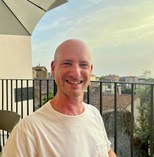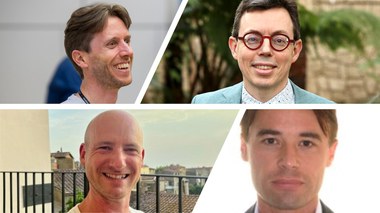Ghent University confirms its position as number one Belgian Host Institution in terms of ERC grants
(11-04-2024) The European Research Council (ERC) has announced the names of 255 outstanding research leaders in Europe set to be awarded ERC Advanced Grants. Four of these are based at Ghent University.
Ghent University is currently ranked as the top Belgian University and fifth European university in terms of acquiring ERC funding. With this result, the success rate of Ghent University applications (28%) is twice as high as the European success rate (14%).
The funding is amongst the EU’s most prestigious and competitive, providing leading senior researchers with the opportunity to pursue ambitious, curiosity-driven projects that could lead to major scientific breakthroughs. The new grants, worth in total nearly €652 million, are part of the EU’s Horizon Europe programme.
Ghent University projects selected for funding
The new grants will support cutting-edge research in a wide range of fields, from life sciences and physical sciences to social sciences and humanities.
VIGILIA (Tijl De Bie)

An explanation for the impact of misinformation is our innate reliance on cognitive heuristics. These are mental short-cuts that help us to make decisions efficiently, but that also make us vulnerable to biases and judgment errors. Misinformation tends to exploit those vulnerabilities, thus greatly increasing its impact.
In the ERC-project VIGILIA, we will investigate a novel strategy to address the so-called post-truth challenges. In doing so, we will stay far from censorship of any kind, to safeguard fundamental liberties. The VIGILIA approach is centered around the detection and mitigation of triggers of cognitive biases and heuristics in humans and societies when consuming and sharing information, whether true or false. We will integrate our results within tools that we refer to as 'VIrtual GuardIan AngeLs' (VIGILs), aimed at news and social media consumers, journalists, scientific researchers, and political decision makers.
e-Cracker (Kevin Van Geem)

Approximately 2% of these emissions stem from the chemical industry, primarily from the production of fundamental chemicals like ethylene and propylene. These chemicals are crucial for manufacturing a vast array of materials, including polymers, which are utilized in massive quantities worldwide each year.
In the ERC-project e-Cracker we will pave the way to avoid more than 200 MtCO2/yr emissions with a scalable, flexible, step-by-step implementable technology driven by renewable electricity. Rather than relying on conventional combustion methods, our vision centers on pioneering a groundbreaking Power-to-Heat (P2H) reactor. When combined with insight in the pressure-dependence of the cracking chemistry this will allow to avoid undesired side reactions and to increase olefin yields of ethane and plastic waste derived naphtha cracking by 10 wt.% compared to yield gains of 0.1 wt.%, at best, when applying alternative P2H such as resistive heating. Moreover, transforming waste materials into useful resources leads to an additional considerable decrease in CO2 emissions because we can avoid the large carbon footprint associated with production and transportation of fossil resources.
New Polities. Political Thought in the First Millennium (Peter Van Nuffelen)

The New Polities project studies the interaction between these two forms of political thought in Late Antiquity (ca. 300-800 AD). Since the Enlightenment, this period has been seen as the time when the ancient city-state gave way to monarchy and rationality became subordinate to religious texts. This view is indebted to an idealised image of Classical Antiquity: even today, Athenian democracy and the Roman republic are held up as examples. But if we look beyond the ‘fall’ of the Roman Empire, we see in Late Antiquity a wide range of new religious and political communities that adopted and modified classical ideas and thus developed a rich political thought.
By studying sources in other languages than Latin and Greek, New Polities will uncover neglected traditions from the first millennium AD, from the Roman Empire to the Abbasids, Byzantines and Carolingians. It will also use late-antique ideas, for example about equality, hierarchy and tolerance, to engage in critical dialogue with modern discussions. In this way, it will not only revise the position of Late Antiquity in the history of political thought but also rewrite the way that history is usually told.
Assumption-lean (Causal) Modelling and Estimation (Stijn Vansteelandt)

This ERC project will develop an innovative paradigm for statistical modeling with the aim of increasing the quality of data analyses by enriching statistical modeling with machine learning techniques and recent insights from causal inference. The mathematical framework behind statistical modeling ensures maximum interpretability, even with an incorrect model, and enables, contrary to what is common, the attainment of honest confidence intervals that take model uncertainty into account.
However, standard machine learning techniques are optimized for prediction and fall short when evaluating associations and effects. This ERC project will therefore develop and optimize adjusted (debiased) machine learning techniques for this purpose.
We will use the developed framework for 'assumption-lean modeling' to address current challenges in causal modeling. This project will yield general methods for data analysis that will be used in this ERC project for the evaluation of medical treatments and interventions, but which also have the potential to impact all empirical sciences, as well as the foundations of statistical modeling.
About the ERC
The ERC, set up by the European Union in 2007, is the premier European funding organisation for excellent frontier research. It funds creative researchers of any nationality and age, to run projects based across Europe. The ERC offers four core grant schemes: Starting Grants, Consolidator Grants, Advanced Grants and Synergy Grants. With its additional Proof of Concept Grant scheme, the ERC helps grantees to bridge the gap between their pioneering research and early phases of its commercialisation.
The overall ERC budget from 2021 to 2027 is more than €16 billion, as part of the Horizon Europe programme, under the responsibility of European Commissioner for Innovation, Research, Culture, Education and Youth, Iliana Ivanova.
Researchers within and outside of Ghent University who wish to apply for an ERC Grant with our university as host institution, can contact the EU Team for advice and support.
Contact
EU-team UGent, eu-team@ugent.be
More information
